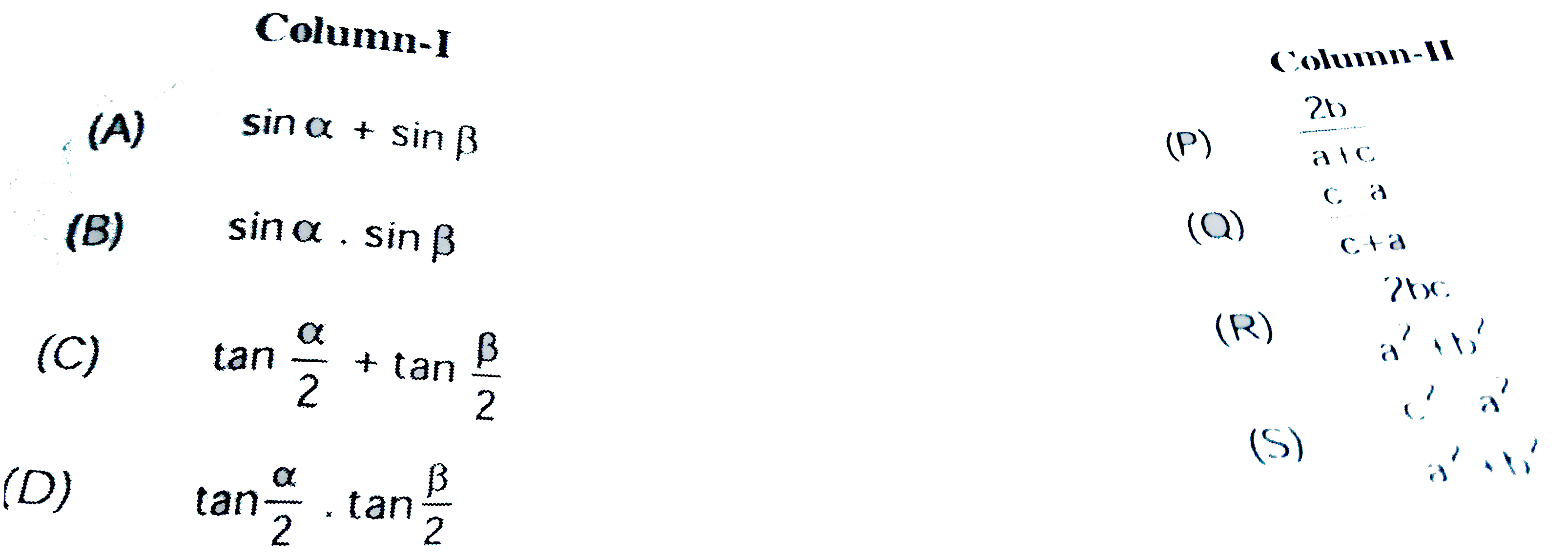Let be two distinct roots of , where a, b and c are three real constants and [0, 2pi]alpha+beta is also a root of the same equation ifSolution in Bengali
a+b=c
b+c=a
c+a=b
c=a
The correct Answer is:D
Step by step video, text & image solution for Let alpha, beta be two distinct roots of acostheta+bsintheta=c, where a, b and c are three real constants and theta in [0, 2pi]. Then alpha+beta is also a root of the same equation if by Maths experts to help you in doubts & scoring excellent marks in Class 11 exams.
Updated on:21/07/2023Topper's Solved these Questions
Similar Questions
Solve the equation :sinθ+sin3θ+sin5θ=0
View SolutionIn △ABC which one of the following is equal to ab cos C+bc cosA?
View SolutionIf alpha and beta ( alpha
View SolutionLet α,β are the root of equation acosθ+bsinθ=c.
Which of the following is/are true.
View SolutionLet α,β are the root of equation acosθ+bsinθ=c.
If α=30∘ and β=60∘ such that a,b,c represent sides of a ΔABC then
View SolutionIf α and β are the roots of the equation, acosθ+bsinθ=c, then match the entries of column I with the entries of column- II

View SolutionIf α and β are 2 distinct roots of equation acosθ+bsinθ=C then cos(α+β)=
View SolutionLet α,β be the roots of the equation (x-a) (x-b) = c,c≠0 , then find the roots of the equation (x−α)(x−β)+c=0
View SolutionLet α,β the roots of the equation (x - a) (x - b) = c , c ≠ 0. Then the roots of the equation (x−α)x−β)+c=0 are :
View SolutionLet α, β be the roots of the equation (x−a)(x−b)=c, c≠0, then the roots of the equation (x−α)(x−β)+c=0 are
View SolutionIf αandβ are roots of the equation acosθ+bsinθ=c then prove that,
sin(α+β)=2aba2+b2
View SolutionLet α,β be two distinct roots of acosθ+bsinθ=c, where a, b and c are three real constants and θ∈[0,2π]. Then α+β is also a root of the same equation if
View Solutionमाना acosθ+bsinθ=c जहाँ a, b और c तीन वास्तविक अचर तथा θ∈[0,2π], के दो भिन्न मूल α,β है | तो α+β भी समान समीकरण का एक मूल है यदि
View SolutionLet α,β be two distinct roots of acosθ+bsinθ=c, where a, b and c are three real constants and θ∈[0,2π]. Then α+β is also a root of the same equation, if
View Solutionα,β হল acosθ+bsinθ=c সমীকরণের দুটি ভিন্ন বীজ, a,b,c তিনটি বাস্তব সংখ্যা এবং θ∈[0,2π] | সেক্ষেত্রে α+β ঐ সমীকরণের আরেকটি বীজ হবে যদি
View Solution
